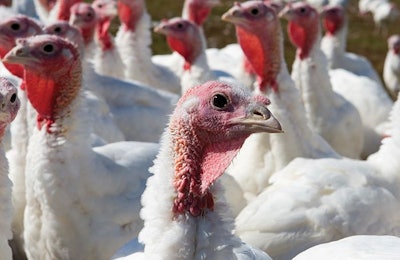
According to the official report to the World Organisation for Animal Health (OIE), the agriculture ministry in Israel has confirmed the presence of the H5N8 highly pathogenic avian influenza (HPAI) virus at a farm in Hadarom (Southern District).
Around 650 cases were identified among the 18,800 growing turkeys, and 150 of the birds died. Affected birds were all kept in one of two pens at the farm, but all surviving turkeys have been culled.
As with the earlier outbreak near Haifa, migrating birds are the likely source of infection. According to the ministry, October is the month when millions of wild birds pass over Israel on their migration routes from Europe.
As well as the two HPAI outbreaks among poultry, the agriculture ministry has also registered with the OIE two further outbreaks among other birds. First to be affected was a mixed flock of water birds at a zoo in Jerusalem. Within days, the same virus was confirmed in a similar flock at a natural park in Tel Aviv. Birds at each location have tested positive for the H5N8 HPAI virus.
So far, it has been the black swans among these flocks that have been most affected. Half of these birds have died or required euthanasia. While one mute swan has also been infected, other water birds at these locations have so far shown no signs of the disease.
Poultry within 10 kilometers of the outbreaks are being tested for the virus, and may not be moved, according to Jerusalem Post. It also reports a ministry recommendation for poultry farm owners in Israel to keep poultry housed while the risk of infection from the wild bird population remains high.
Avian flu situation in Kazakhstan
“Stabilized and under control” is how the Kazakh prime minister now describes the avian flu situation in his country. Kaz Inform reported this among other key points in his address to the government earlier this week.
Monitoring of the situation is ongoing, according to Premier Askar Mamin. He added that recent HPAI outbreaks in the country had indicated a need for improvements in the rapid response measures to similar disease threats in future.
Poultry keepers in U.K. urged to be on high alert for avian flu
Last week, the agriculture department of the United Kingdom (U.K.) government urged all poultry keepers to prepare for the coming flu season. At this time of year, birds are at particular risk of the disease.
All four of the country’s chief veterinary officers called for poultry owners to maintain enhanced biosecurity standards at all times. The most important measures are to keep areas where poultry, game birds and pet birds are kept clean and disinfected.
Wherever possible, poultry should be kept separate from wild birds, as they may be infected with avian flu viruses. Many migratory birds are returning to the country for the winter, and they represent a particular disease transmission risk.
According to the government, the U.K. has been free of HPAI since September of 2017. However, a low-pathogenic avian influenza (LPAI) virus was detected in December of last year. This posed no risk to human health, and the country declared itself free of avian in June of 2020.
Earlier this month, poultry owners throughout the European Union were warned to be alert for signs of avian flu in their birds. Risk of virus transmission has been raised by the recent outbreaks of the disease among poultry in Kazakhstan and Russia.
Further easing of avian flu restrictions in Australia
Since October 20, the poultry housing order has been lifted in the Restricted Area of the Golden Plains Shire region of Victoria.
While the control areas immediately around the earlier outbreaks has been reduced in size, boundaries of the Restricted Areas remain in place. According to the state department responsible, Agriculture Victoria, this measure is required for the progression towards eradication. Official permits are still required for all movements of poultry, poultry products, equipment and vehicles anywhere in these designated zones.
In July and August of this year, three different strains of avian influenza virus were identified across six farms in Victoria. The H7N7 HPAI virus was detected at three eggs farms. At two turkey farms, birds tested positive for the H5N2 LPAI virus, and the H7N6 LPAI virus variant was found in emus at another premises.
View our continuing coverage of the global avian influenza situation.

















